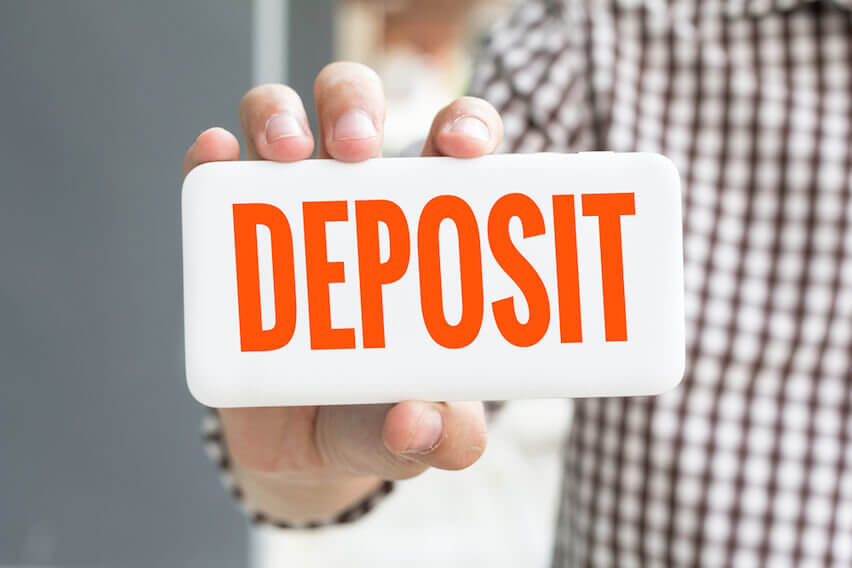
verb (used with object)
- to place for safekeeping or in trust, especially in a bank account: He deposited his paycheck every Friday.
- to give as security or in part payment.
- to deliver and leave (an item): Please deposit your returned books with the librarian.
- to insert (a coin) in a coin-operated device: Deposit a quarter and push the button.
- to put, place, or set down, especially carefully or exactly: She deposited the baby in the crib.
- to lay or throw down by a natural process; precipitate: The river deposited soil at its mouth.
verb (used without object)
- to be placed, inserted, precipitated, left for safekeeping, given as security or in partial payment, etc.
noun
- money placed in a bank account or an instance of placing money in a bank account.
- anything given as security or in part payment: The boy returned the bottle and got his five-cent deposit back. They made a deposit on the house and signed a ten-year mortgage.
- anything laid away or entrusted to another for safekeeping: A large deposit of jewels was stolen from the hotel safe.
- a place for safekeeping; depository.
- something precipitated, delivered and left, or thrown down, as by a natural process: a deposit of soil.
- the natural sediment of wine in a bottle.
- a coating of metal deposited on something, usually by an electric current.
- a natural accumulation or occurrence, especially of oil or ore: a mountain range with many rich deposits of gold.
verb (tr)
- to put or set down, esp carefully or in a proper place; place
- to entrust for safekeeping; consign
- to place (money) in a bank or similar institution in order to earn interest or for safekeeping
- to give (money) in part payment or as security
- to lay down naturally; cause to settlethe river deposits silt
noun
-
- an instance of entrusting money or valuables to a bank or similar institution
- the money or valuables so entrusted
- money given in part payment or as security, as when goods are bought on hire-purchaseSee also down payment
- a consideration, esp money, given temporarily as security against loss of or damage to something borrowed or hired
- an accumulation of sediments, mineral ores, coal, etc
- any deposited material, such as a sediment or a precipitate that has settled out of solution
- a coating produced on a surface, esp a layer of metal formed by electrolysis
- a depository or storehouse
- on deposit payable as the first instalment, as when buying on hire-purchase
1620s, from Latin depositus, past participle of deponere “lay aside, put down, deposit,” also used of births and bets, from de- “away” (see de-) + ponere “to put” (see position). Related: Deposited; depositing.
1620s, from Latin depositum, from deponere (see deposit (v.)). Geological sense is from 1781; monetary sense is from 1737.
v.
- To lay down or leave behind by a natural process.
- To become deposited; settle.
n.
- An accumulation of organic or inorganic material, such as a lipid, in a body tissue, structure, or fluid.
- A sediment or precipitate that has settled out of a solution.
- An accumulation or layer of solid material, either consolidated or unconsolidated, left or laid down by a natural process. Deposits include sediments left by water, wind, ice, gravity, volcanic activity, or other agents. A layer of coal formed over many years through the decomposition of plant material is also a deposit.
 Liberal Dictionary English Dictionary
Liberal Dictionary English Dictionary



